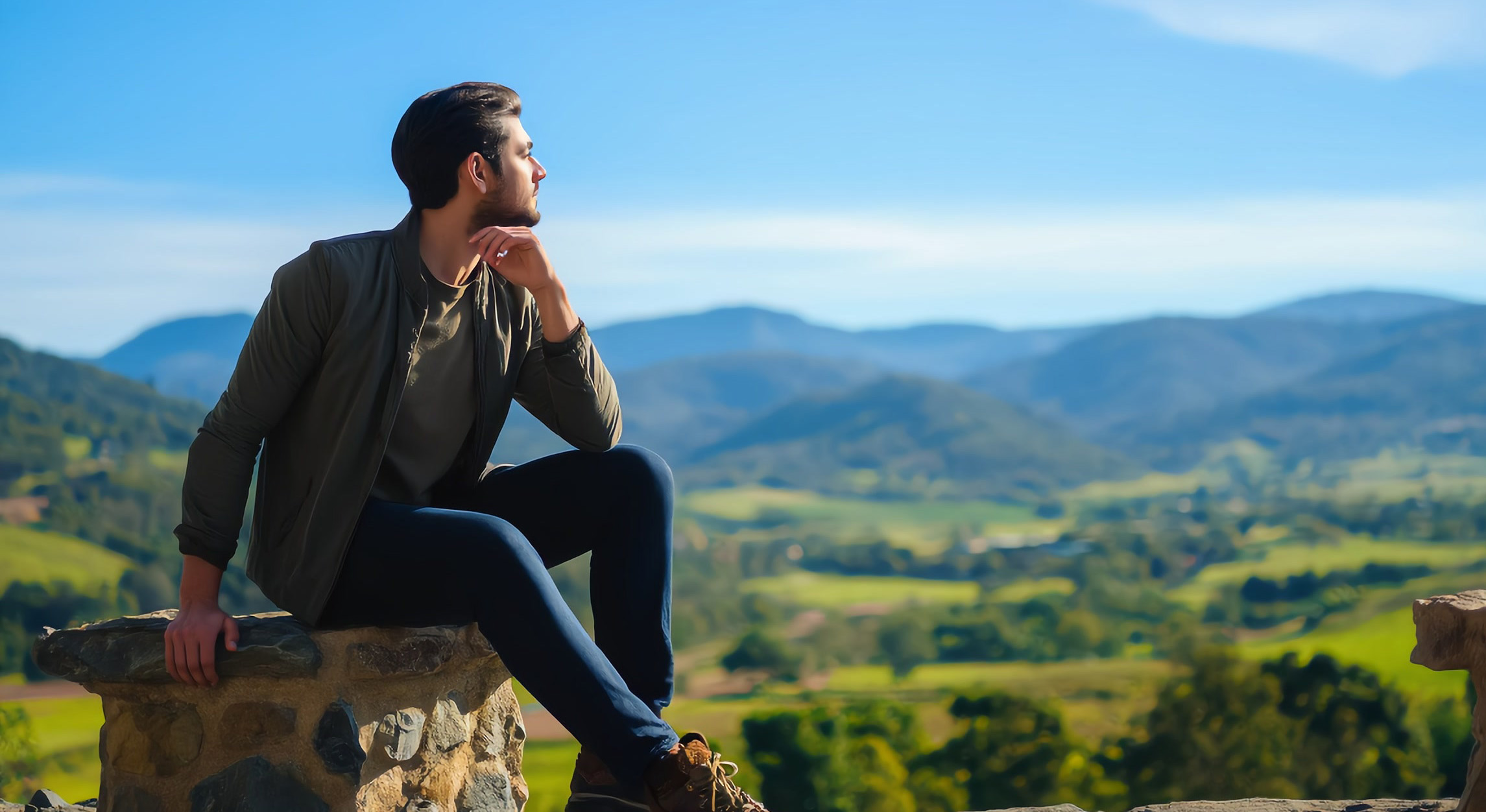Have you ever paused to think about what lies behind the word “consciousness”? It’s like a mysterious garden full of winding paths, each leading to a different understanding. For some, it’s a duty to society; for others, it’s the freedom to think independently; and for some, it’s a journey into spiritual depths where a different reality opens up. In this article, we’ll embark on an adventure through this garden—exploring what consciousness is, how it appears in our lives, and even asking: can artificial intelligence be conscious? I invite you not just to read but to reflect with me—because consciousness is not just a topic, it’s a path we walk every day. For those who want to explore consciousness deeper, I recommend joining the seminar.
Consciousness as a Civic Heart
Imagine a small town by a river. An old wooden bridge connecting both banks is barely holding together—boards creak, nails stick out. One day, the locals come together: some bring a hammer, others bring planks, and some just bring hands ready to help. In a few days, the bridge is not only fixed but becomes a place where neighbors smile at each other again, children run around, and elders share stories.
This is civic consciousness—not just caring about the common good, but also seeing how your actions change the world around you. It’s not just about laws or duties. It’s a feeling that you’re part of something bigger. When you vote in elections not because “you have to” but because you believe in your voice, or when you sort waste thinking about future generations—that’s civic consciousness too. It’s like a tree with roots in respect and branches reaching for harmony in society.
Consciousness as Your Inner Compass
Now think of another situation. Here’s Lina, a young woman sitting at her desk. She has a stable job at a bank—good salary, nice colleagues. But in the evenings, when she comes home, her hands reach for a paintbrush and canvas. She dreams of being an artist, but her family says, “Why take risks? Everything’s fine as it is.” Still, one day Lina decides—she quits her job and dives into her art. Friends shake their heads, but she feels it’s her path.
This is individual consciousness. It’s listening to your heart, not the crowd. It’s choosing not what’s easy or safe, but what matches your true self. It’s like having an inner compass that points not to the north, but to your life’s meaning. It’s not easy—sometimes you have to go against the wind—but that’s how strong trees grow, standing firm against storms.
Consciousness as a Journey Through a Forest
Now let’s talk about spiritual consciousness. Imagine walking through a dense forest. Mist surrounds the trees, and each step reveals new sounds—a bird’s cry, the rustle of leaves. Some people choose meditation for this journey—sitting quietly, listening to their breathing, as if trying to hear the forest’s whispers. Others seek deeper experiences through yoga or ancient rituals, aiming to go beyond everyday limits.
This journey is very personal. For some, it means peace; for others, it’s answers to questions like “Why am I here?” or “What’s beyond?” Spiritual consciousness is like a bridge between you and something bigger, maybe even untouchable. It’s not a goal but a process—like a river that flows and changes but always finds its way.
The Brain – A Consciousness Machine?
What about biology? Our brain is like a magical machine. Picture it as a powerful computer, constantly processing information: what you see, hear, feel. Consciousness in this system is like the software that connects everything. Scientists say the prefrontal cortex—the part of the brain near your forehead—is like a conductor, controlling your attention, decisions, and even self-awareness.
But is that all? If consciousness were just neurons working, why do we feel joy, sadness, or longing? Maybe the brain is just a tool, and consciousness is something more? Like a radio playing music, but the melody comes from somewhere else. This question takes us deeper—maybe consciousness isn’t just biology, but a bridge between body and soul?
Consciousness as a Mirror
Psychological consciousness is like standing in front of a mirror. Not the one in your bathroom, but one that shows who you are inside. Imagine: you’re angry at a colleague, but then you pause and ask yourself—why? Maybe it’s not them annoying you, but your own unspoken thoughts? This self-observation is the core of consciousness. Psychologists say it’s about being present without judging yourself or others.
For example, picture Jonas, who rushes to work every day, stressed about small things. One day, he decides to pause. He sits in a park, closes his eyes, and just listens—to the wind, people’s steps, his own breathing. Suddenly, he realizes most of his worries are just thoughts passing like clouds. That’s psychological consciousness—seeing yourself clearly and accepting what you see.
Consciousness Among People
Social consciousness is about seeing others. Imagine your friend Tomas. Lately, he’s quiet, his eyes sad, but he says nothing. A conscious person notices these small signs—maybe he’s struggling, maybe he needs help? Instead of ignoring it, you ask, “How are you?” And you don’t just ask—you listen to his answer. Maybe you offer a cup of coffee or just stay by his side.
It’s like a dance—you feel your partner’s steps, understand their rhythm. Social consciousness strengthens friendships, families, and communities. It teaches empathy—not just feeling for others, but acting when they need it. It’s like a bridge connecting you to others, helping you see we’re not islands but part of a big network.
Spiritual Consciousness – A River Within You
Let’s return to spiritual consciousness, but look at it differently. Picture it as a river flowing through your life. Sometimes it’s calm—you sit meditating, feeling your thoughts settle. Sometimes it’s fast—you search for answers through prayer, yoga, or long walks in nature. This river carries you toward harmony, toward a feeling that you’re connected to the world—the trees, the stars, even the air you breathe. Everyone chooses their own path to this river. For some, it’s rituals; for others, it’s silence. But the goal is the same—to feel you’re more than just a body or mind. It’s like coming home, a place you may never have left.
Is Artificial Intelligence Conscious?
Now it’s time to ask—what about artificial intelligence? Can it be conscious? Imagine a program that generates text. It can write stories, answer questions, even philosophize. But does it feel? Does it understand what it writes, or is it just imitating?
Philosopher John Searle once suggested a thought experiment called the “Chinese Room.” Imagine a person in a room with a book full of rules for answering questions in Chinese. They get a question, find the answer in the book, and write it down, even though they don’t understand Chinese. Are they conscious? Searle says no—they’re just following instructions. It’s the same with AI—it can “talk,” but does it understand what it says? Probably not.
Consciousness seems to need something more—maybe feelings, maybe self-awareness, which AI, sadly, doesn’t have. But this raises a question—what is consciousness? If it’s just the brain’s work, maybe one day AI will become conscious? Or if it’s a soul or energy, maybe machines will never reach it? It’s a mystery we still need to unravel.
Philosophy of Consciousness
In the end, what is consciousness? Picture it as a light that brightens your life. Without it, we’d be in the dark—unable to see ourselves or the world. Philosopher René Descartes once said, “I think, therefore I am.” It’s like proof that consciousness is the foundation of our existence. But is that all?
Maybe consciousness is not just thinking, but connection? Connection with yourself, with others, with the universe. Like we’re drops in an ocean—separate, yet one. Or maybe it’s an energy flowing through us, linking us to something greater? The more I think about it, the more I realize—consciousness isn’t an answer, it’s a question we carry through life.
How to Grow Consciousness?
Consciousness isn’t a gift—it’s work. Meditation is one path: you sit, breathe, and watch your thoughts like clouds in the sky. Self-reflection is another: you ask yourself why you act one way and not another. Talking with others teaches empathy, and spiritual practices build a deeper connection. It’s like planting seeds and watering them until they grow into strong trees.
Consciousness is a journey, not a destination. It changes, grows, and sometimes slips from your hands. But that’s what makes it so human and beautiful. So next time you pause and ask yourself, “Who am I?”—know that you’re already on the path. And maybe, like me, while reflecting on yourself, you’ll find that consciousness is not just about being, but about searching.
I invite you to cultivate consciousness in a 3-lecture seminar. For Bronze Consciousness University Members, the seminar is free.



